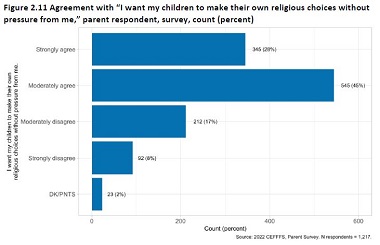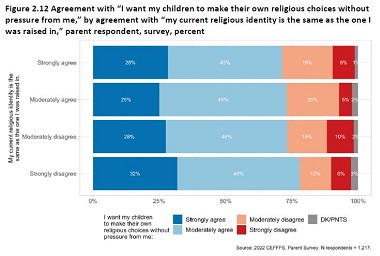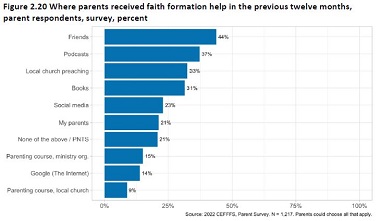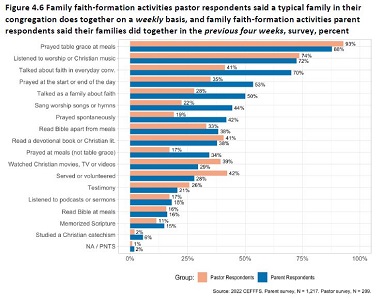 An extensive study of “faith formation of children in the home” was published by the Evangelical Fellowship of Canada April 11.
An extensive study of “faith formation of children in the home” was published by the Evangelical Fellowship of Canada April 11.
Following is their release describing the study, then the Executive Summary. (Go here to download the full report.)
How is Christian faith shared from one generation to the next? What help does the local church provide? In 2019, 17 Canadian ministry organizations and denominations partnered with the EFC Centre for Research on Church and Faith (CRCF) to help answer such questions.
Parenting Faith, the 245-page report released today, presents the findings of this uniquely Canadian research that identifies what helps and hinders the transmission of faith from this generation of parents to their children.
“In our various and distinct ministry areas, we all observed that children and young people seem to be leaving the Church more than they are staying,” says Eric Provost, executive director of Awana International Canada. “We share a deep concern about that trend, along with the conviction that understanding what is happening within families can help churches and ministry organizations serve and help those families better.”
The research, conducted by the CRCF, involved interviews with Canadian evangelical parents and family ministry experts as well as surveys with 1,217 parents representing 3,041 children across Canada. The report identifies the cultural influences and parental priorities that are currently shaping how beliefs and faith-related behaviours are adopted or rejected by the next generation.
“Parenting Faith identifies both gaps and opportunities for churches, ministry organizations and parents to help us all better guide youth into a life of following Jesus and meaningful belonging and participation in the Church,” says Rick Hiemstra, lead researcher and CRCF director.
“As parents ourselves, we were fascinated to hear other parents share their hearts, and in many cases, their actual techniques for nurturing a love of God within their kids. We are excited to think about how this report will equip leaders and practitioners to understand the context parents are living in now, and how they can most effectively come alongside.”
 The report also reveals seismic shifts in how parents of this generation view and carry out their role as shapers of faith in their children’s lives, compared to the previous generation and their own parents.
The report also reveals seismic shifts in how parents of this generation view and carry out their role as shapers of faith in their children’s lives, compared to the previous generation and their own parents.
Seventy-three percent of surveyed parents believe it is essential to offer their children religious choice without any pressure, while 32 percent of respondents report that their own upbringing was quite different. They recall their own parents requiring unquestioning obedience to religion and not offering explanations about faith.
The survey reveals that, in contrast to previous generations, these parents do like to discuss faith with their children, and often do so casually while on the move from one extracurricular activity to another or during other transition times during an ordinary day.
The research also shows other typical faith-forming activities like reading the Bible, praying or sharing personal testimonies are not being practised by children in a way that would indicate they would continue to practise them as adults
An astounding 99 percent of parents surveyed say their role in faith formation is to teach and model their faith.
Executive Summary

Parenting Faith
In October 2019, a consultation was held at Muskoka Bible Centre with denomination and ministry organization leaders on the needs of parents as they form the faith of their children.
This led to the formation of a research partnership between 17 organizations to answer the question, “How can evangelical parents be better supported as they form the faith of their children in the home?”
The Evangelical Fellowship of Canada’s (EFC) Centre for Research on Church and Faith (CRCF) was commissioned to conduct phased, mixed methods research, reporting to the research partners at the end of each phase for feedback and direction.
Our primary research population was Canadian, evangelical parents with children under the age of 18 in the home. Evangelical was defined as those connected with one of the EFC’s affiliates. Samples for interviews and surveys were generated by quotes and by referral samples respectively. Because of our sampling methods, the parents in our samples tended to be more devout (defined in section 2.1.2) than what we might expect in a typical evangelical church.
Parents we interviewed commonly and intentionally conducted faith formation with their children differently than their parents did with them. Usually this meant providing their children with more explanation for the faith and giving them more freedom to accept, reject or question Christianity. Parents also emphasized the importance of giving their children religious choice and talked about exposing their children to other faiths to make that choice substantive.
 Although most parents believed they should be leading their children to Christ, they did not want their children to feel undue pressure from them to do so, resulting, at least in the interviews, to a preference for role modelling over teaching because it is more suggestive than directive.
Although most parents believed they should be leading their children to Christ, they did not want their children to feel undue pressure from them to do so, resulting, at least in the interviews, to a preference for role modelling over teaching because it is more suggestive than directive.
The consensus among ministry experts was that parents were ill equipped and rudderless in their approach to faith formation with their children. Parents by contrast, tended to say that given more time and resources they would not change anything in how they currently do faith formation with their children. Parental confidence that they were doing a good job with faith formation seemed to rise the less they objectively did.
There was a gender imbalance in faith formation of children, with moms more engaged than dads. Most of our parent survey sample identified as complementarian, believing in distinct roles for men and women in the home and in church life. However, we found that in many cases, their complementarianism was more nominal than functional.
Since referral samples tend to attract respondents who are most interested in the subject, this indicates parents’ interest in the faith formation of children tends to peak when their children are about nine or 10 years of age.
Parents expressed worry about many things, mostly what they saw as the negative influence of culture and state. In fact, 64 percent of parents surveyed, either moderately or strongly, agreed that they were concerned their children will experience religious persecution in Canada.
 As mentioned above, parents told us they seek to do faith formation differently with their children than their parents did with them, and this is reflected in a small share of parents receiving faith-formation help from their parents.
As mentioned above, parents told us they seek to do faith formation differently with their children than their parents did with them, and this is reflected in a small share of parents receiving faith-formation help from their parents.
Most commonly, parents looked to their peers and podcasts for help forming the faith of their children, with very few finding help in parenting courses, offered by churches or ministry organizations. Where parents were helped by their local church was usually through its preaching that was not necessarily focused on parenting.
Parents saw the church as a partner in the faith formation of their children and also as an important source of Christian socialization and exposure to Christian teaching. However, parents tended not to defer to churches in teaching, reserving instead the role of final arbiter of doctrine for themselves.
COVID-19 (COVID) and the attendant restrictions on in-person public worship coincided with our research. Where online church did not engage children, families’ worship service attendance tended to decline which left them less connected to church life even after restrictions on in-person worship were lifted. Just over half of parents surveyed reported that their churches provided children’s content or home-based resources for parents to use during the COVID pandemic.
Faith formation is as much a function of our habits as of what we teach. We looked at several faith-formation activities practiced in the home by both children and parents. Activities supported by the family social context were most likely to occur. Literacy-dependent activities, such as Bible reading, rose with the onset of literacy before starting to decline in the later teen years. Only in Bible memorization did children outstrip their parents in faith-formation activity participation.
In aggregate, and for most types of faith formation, children’s participation did not rise to meet the level of their parents by the late-teen years, suggesting that religious transmission, expressed in faith formation activity participation, is often not happening.
 Faith formation activities are not just something that you do, they are habits grounded in the life of the family providing structure, place and ways for children to express their faith.
Faith formation activities are not just something that you do, they are habits grounded in the life of the family providing structure, place and ways for children to express their faith.
We found that the faith conversations parents have with their children have their own domestic calendars and geographies.
Most often these conversations happen at the transition points in a child’s day; when they are moving from one activity to another. These happen most often in transit (the car), in the bedroom or at the dinner table, although the place varies with age.
Extracurricular activities are typically directed and facilitated by parents and, insofar as they aim to develop a child’s skills or socialize them, they are an extension of children’s overall formation. Half of families surveyed have their children out of the home at an extracurricular activity one or two days a week. Although activities related to faith were often cited as extracurricular activities, various sports, collectively, was the top activity.
Whereas extracurricular activities tend to have a weekly cadence, camping tends to have an annual one. Christian day camp (i.e., VBS) was more common among middle school-aged children whereas week-long, overnight children’s camp became more common for teens.
Parents had a conflicted relationship with digital technology as it relates to the faith formation of their children. On the one hand, many were positive about the promise of technology as a work tool and as a conduit for quality Christian content. On the other hand, they were vexed by the additional content technology tended to pipe into their children’s lives.
Most of their discussion about the role of technology in the faith formation of their children was about their attempts to control, limit or manage their children’s access to it. Most commonly, parents opted for giving their children age-appropriate, daily, digital technology time limits in lieu of evaluating the content their children were consuming.
This is a substantial document. We have tried to listen carefully to parents and those who support them, and faithfully summarize and reflect what we heard. We hope this report and the conversations following, form the foundation for creative, biblical responses that support parents as they form the faith of their children in partnership with churches and other ministries.
Go here for free access to the full report, which offers a wealth of interviews, graphs, interpretation and much more.
